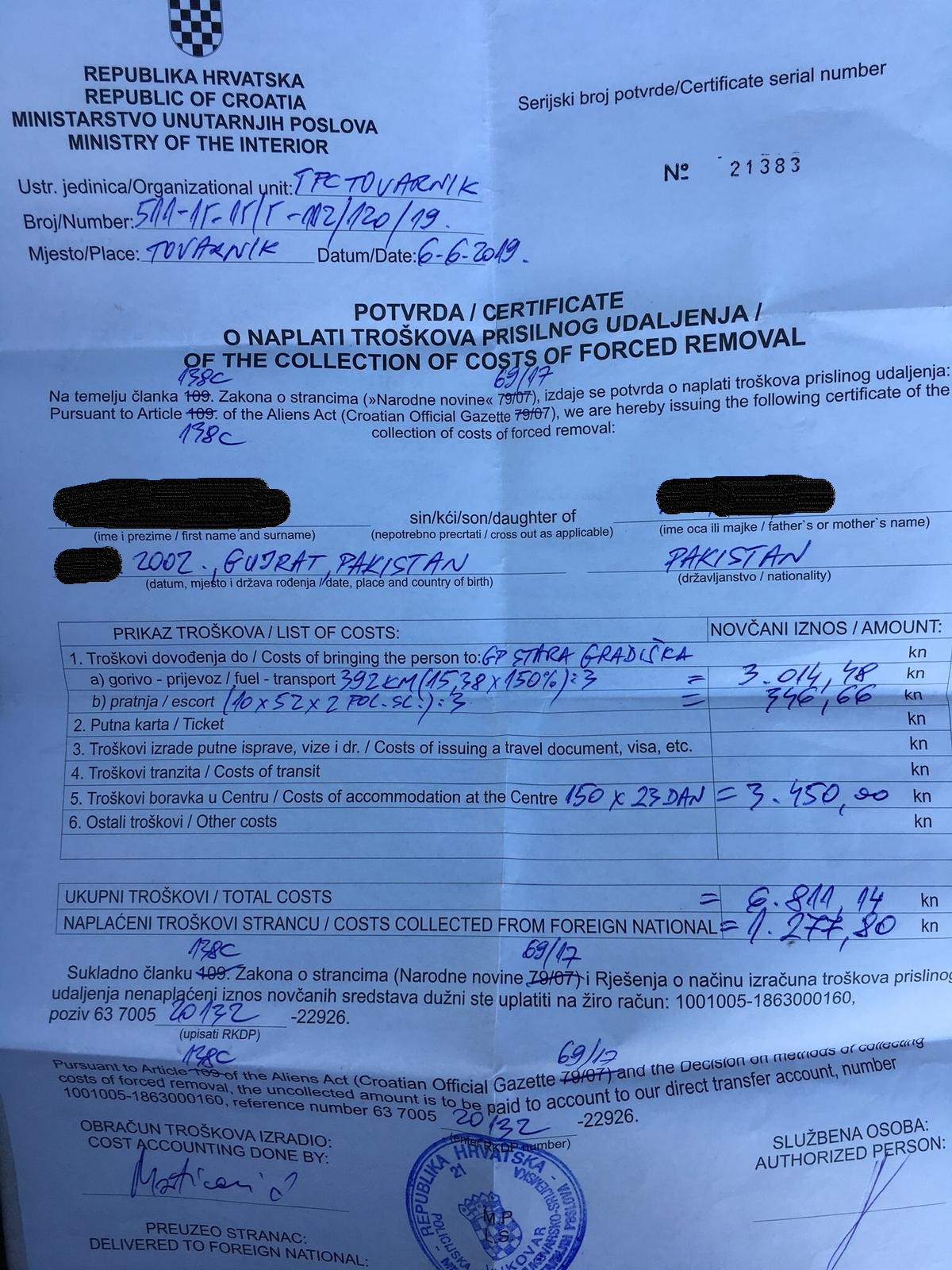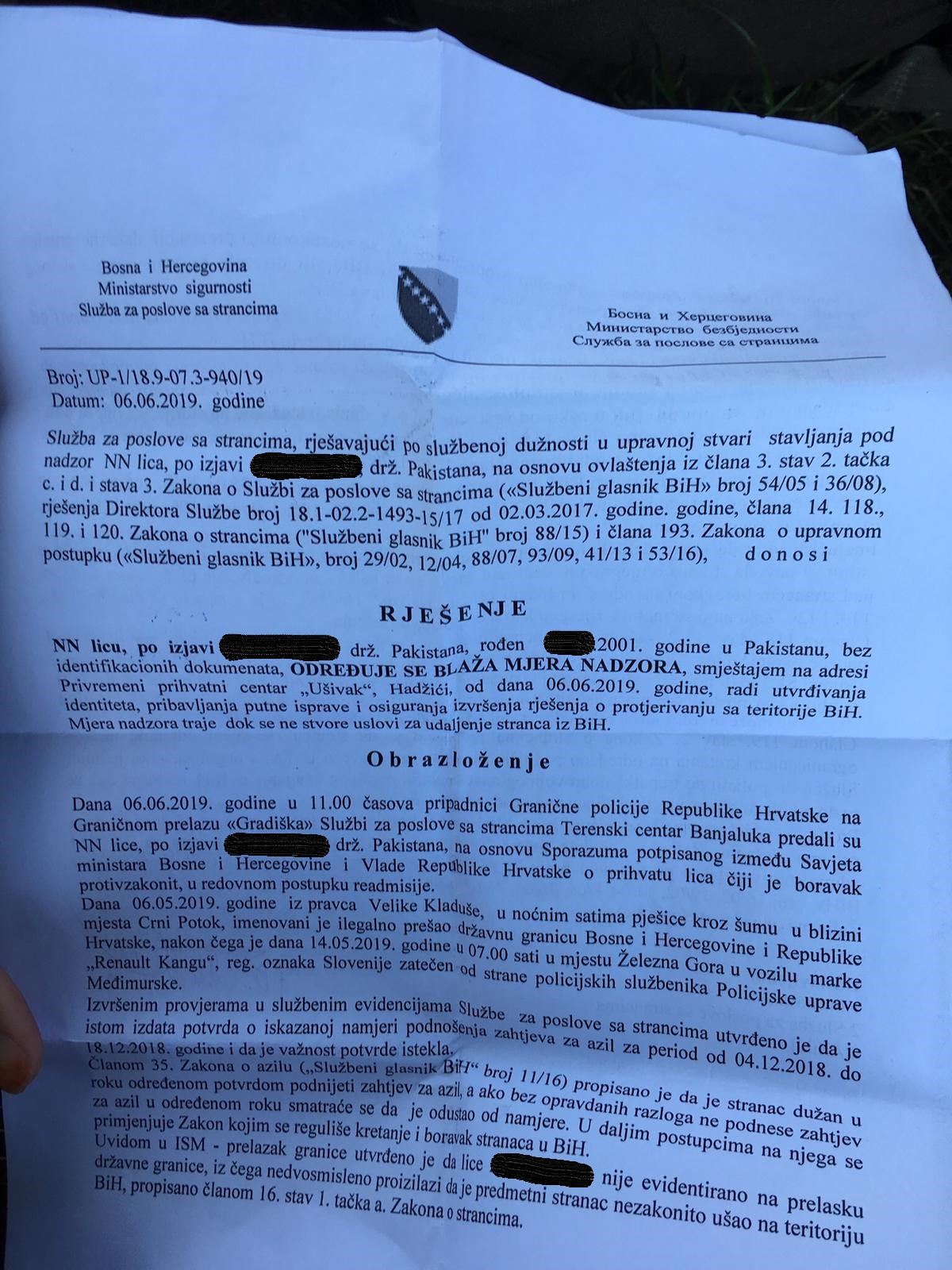Like many groups before them the group of 9 men from Pakistan between ages of 17 to 30 decided to go to the game from the area popular among the migrants located in the northern part of Bosnia and closest to the boarder of Croatia. This time they were caught by Croatian police and brought back to Sarajevo.
Only one person in the group spoke English and this interview was conducted with a bright, communicative 17 years old boy from Pakistan.
We sat under the tree, covered by shadows, in the park across the train station in Sarajevo. I offered some green tea to the group and shortly afterwards the respondent began to tell their story.
The group started their game from Velika Kladusa on 4th of May. They managed to cross border and enter Croatia after a few hours of walk. The respondent explained how they just continued to walk usually traveling during the night and sleeping or resting during the day.
The group was prepared to spend several nights in the forest, but after 10 days of walking through the jungle the group spent all of their food and water supplies. The situation effected the group and they became desperate and irrational so one night, just before the dawn, they decided to exit the jungle and hike down to the nearby road.
The respondent explained how somebody stopped their vehicle and decided to give them a lift.
After brief examination of the documents provided by the respondent I realized that the car that gave them a ride was a family type car Renault Kangoo with enough space to just barely fit the entire group.
Lucky I thought until the respondent continued his story.
“The driver was drunk already”, the respondent explained, “but he continued to drink in the car”.
Accident was bound to happen. After some time the driver fell asleep behind the wheel.
The accident occurred on May 14th at 7:00 near Železna gora, only a few kilometers and couple of minutes drive from the Slovenian border.
The ambulance and the police came shortly after the accident happened.
The respondent said that no one was seriously injured and that the group was separated from the driver and then transferred to a nearby hospital where they stayed for 2-3 hours. No treatment was subscribed since no one was seriously injured.
The respondent recalls that 3-4 police officers escorted them to the hospital. After 1-2 hours in the hospital the same police officers used a van to transport them to a prison where they stayed for 23 days. The respondent said that the ride to prison lasted around 25 minutes and although the respondent had no complaints about the police driving he clearly stated that the police officers took all their phones, money and sleeping bags.
“We have this police paper”, the respondent said ”but no money back, no phone back, no sleeping bags back”.
According to the respondent police officers confiscated around 1100 euros and took their phones, money and sleeping bags.
At this point of interview the respondent underlined that it was the other police officer that escorted them inside the prison and it is obvious that this police officer was not part of the group that confiscated their property.
Inside the prison the group was separated. The respondents prison experience is as positive as possible considering the circumstances although they were never given a lawyer, translator and they never had been informed about the case or the reasons of imprisonment.
The police never took their fingerprints and when asked why are they being imprisoned the police officers ,according to respondent, answered that “the judge made a decision about the case”.
The respondent continues his story and describes that prison rooms had 2 bulk beds (4 in total), toilet and sink and that the food was served 3 times per day. For breakfast they were usually served 2 or 3 slices of bread, cheese, jam and 1 orange and for lunch and dinner they were usually served chicken, slices of bread and potatoes. He was not sure if the rice had been served on Friday or Saturday.
Respondent also stated that they were allowed to go outside, in the area surrounded by fence.
“The prison guards were nice”, the respondent recalls that they always asked was everything ok and were there any problems?
After thoroughly examining the papers that the respondent showed me I realized that he had his 17th birthday while inside the prison.
When I asked him how he celebrated his birthday and if he could remember anything special about that day the respondent said
“On my birthday they (the prison guards) gave me chocolate.” and he started to laugh as if one chocolate could undo all the injustice in the world.
According to the respondent the prison accommodated only small number of people. Except for the group of 9 Pakistan men there were also 4 Chinese prisoners in one of the prison rooms and there were always 4 prison guards present inside the prison.
After 23 days in prison the Croatian immigration officer came and questioned them without taking fingerprints. After the questioning the group was transported separately in 2 vans with immigration officer present. According to the respondent Croatian immigration officer met with the Bosnian immigration officer on the boarder and they continued their journey towards Banja Luka.
In Banja Luka they were held in SFA offices for 20 minutes and were questioned by 2 police officers who spoke English language. After the questioning they were transported to SFA offices in Sarajevo and from there the group was transported to camp Ušivak.
At the end of interview the respondent smiled and said: “We woudn’t leave our country if we didn’t have problems…” his eyes brightened a little as he spoke “we want to do something for our families…we will try again!”
The respondent provided two documents that confirm his story.
One of the documents was issued by the Ministry of Security of BiH and that document includes case history and the statement that the Croatian Border Police of “Gradiška” reacted according to agreement between government of Croatia and Ministry of Bosnia and Herzegovina and that the named person is to be admitted to camp Ušivak and that the light control methods should be taken against the named person as advised in the SFA document
The other document is The Collection of Costs of Forced Removal from Croatia with total cost of 6.811,14 kuna minus costs collected from foreign national 1.277, 80 kuna. The sum mentioned in the document is much less than the amount that was confiscated from them.


